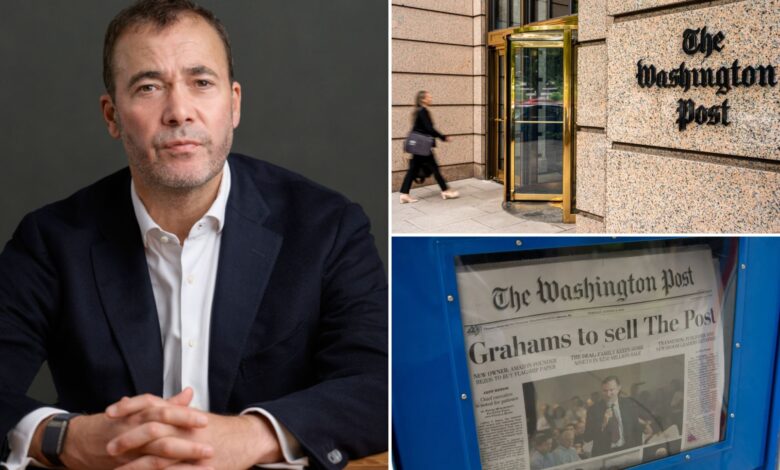Washington Post CEO Bill Lewis running damage control

New Washington Post CEO Will Lewis is already running damage control after he ignited a firestorm at the legacy newspaper this week.
“I know trust has been lost because of scars from the past and the back-and-forth from this week,” Lewis wrote Friday morning in a company-wide memo obtained by the Wall Street Journal.
“Let’s leave those behind and start presuming the best of intent.”
The British-born media exec appealed to his nearly 4,000 employees to forgive the onslaught of negative attention that fell on the 144-year paper this week after he announced his disastrous restructuring plans hours after the Washington Post’s first female executive editor, Sally Buzbee, suddenly stepped down.
Lewis replaced the trailblazer with a white man and appointed another to a second, equal role in his new hierarchy.
“In some quieter moments this week, I have been reflecting on leadership styles, trust and humility,” he wrote in his memo.
The new CEO shared excerpts from two emails he received from staffers during the week, both of which offered support for Lewis as he faced widespread backlash.
Lewis, who took the job in November, also pushed back on a New York Times story claiming he and Buzbee “clashed” for months before she decided to resign from the executive editor position.
He concluded the memo by admitting he needed to improve his listening and communication skills and told staffers they were invited into collaboration sessions for his restructuring plans, which divide the company into a “first,” “second” and “third newsroom.”
“On the concerns many of you raised about creating a diverse workforce that looks more like America, I know I cannot just talk a good game, but need to show it,” Lewis said. “I assure you I will.”
Lewis’ headache unfolded with his all-hands staff meeting Monday, in which he introduced Buzbee’s temporary replacement, Matt Murray — the former editor-in-chief of The Wall Street Journal.
Robert Winnett, another friend of Lewis and fellow Brit who did stints at The Daily Telegraph and The Sunday Telegraph will take over the “first newsroom” after that.
Murray would then move on as the leader of the “third newsroom” focusing on service and social-media journalism.
Under Lewis’ plan, the Opinion section would serve as the “second newsroom.”
The meeting ruffled staffers’ feathers, with several questioning Lewis on his hiring practices and the lip service he had paid to raising diversity in the newsroom.
Lewis cannot “expect to bring in new readers” when he’s “abolished all diversity from the leadership,” one insider said.




